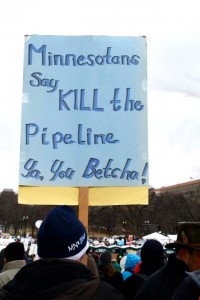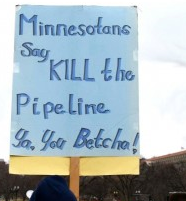With with the fate of the Keystone XL crude oil pipeline in the balance, juniors Carly Dent and Claire Krebs rallied against this project in Washington, D.C.
Dent and Krebs joined tens of thousands of people of all ages on Sunday who are against the Keystone XL project that if fully constructed, could transfer 830,000 barrels of oil per day from the Canadian Tar Sands down to Texas.
Krebs said this protest, which took place around the White House, was the largest environmental protest in history.
“There were approximately 50,000 people there to protest the pipeline,” Krebs said.

Dent and Krebs, both interns at Minnesota 350, said they want President Barack Obama to stop this pipeline, and in an effort to make this happen, they went to protest in Washington, D.C.
“Carly and I heard of this opportunity through an event with Bill McKibben on Nov. 1. Bill McKibben, the creator of 350.org, was planning this rally to try and stop the Keystone XL pipeline,” Krebs said.
Dent was inspired by McKibben’s presentation, and became involved in making sure that Minnesota was sending as many protesters as possible.
“I was so inspired to go,” Dent said. “I took on the role of helping to plan and organize the bus to head out to DC and take 170 Minnesotans there.”
As one of the bus captains, Dent said she helped plan the trip as well as manage social media promotions for the event.
Krebs said officials appreciated the support from participants, and that the people protested around the White House after listening to McKibben, senators, indigenous leaders and the head of the Sierra Club speak about the movement.
“All 50,000 people walked around the White House together carrying our signs demanding clean energy, less use of crude oil, and a future for the generations still to come,” Krebs said.
Dozens of protesters, including McKibben and Robert F. Kennedy Jr., were arrested after engaging in civil disobedience near the gates of the White House. Some activists attached themselves to the White House fence and others refused to move after being ordered to do so by U.S. Park Police.
Bringing it back to campus
McKibben was back in Minnesota by Wednesday to present his series to St. Thomas which was called “celebrating and preserving winter: responding to climate change in Minnesota and Wisconsin.”
The most powerful movements often start as grassroots, and McKibben said college campuses are a great breeding ground to spark more attention. He compared student involvement in the 350 project to the changes made in South Africa to end Apartheid.
When speaking at St. Thomas, McKibben said he was confident that students could make the same statement in global warming.
St. Thomas Director of the Environmental Studies Program Elise Amel said the movement is important. She said the pipeline has several repercussions.
“(The pipeline) perpetuates the fossil fuels burning, which is one of the problems creating the greenhouse gasses that are creating climate change,” Amel said. “The other feature is that the pipeline tends to run through areas that probably should be protected from destruction, so they tend to be wildlife habitats.”
Junior Annie Longfellow is a political science major, and said it is great that students are actually trying to influence policy.
“It’s great to see people my age who are interested in participating in the political process,” Longfellow said.
However, Longfellow isn’t sure if she would participate in the rally for this particular issue.
“The intent is good because having increased access to energy sources and relying less on foreign oil are both really good goals,” Longfellow said. “I understand it there is a risk for negative environmental effects which are especially bad for the U.S. as we are trying to be a leader on clean energy.”
Sophomore Matt Anderson also isn’t fully sold on the importance of protesting against the pipeline.
“Increased access to fossil fuels will help put off our energy issues for the short-run and alleviate some of the pressure on consumers’ wallets,” Anderson said. “We need to invest in developing other means to satisfy our growing energy needs…It depends on how it (the pipeline) is being constructed.”
Amel said she was envious of the students’ ability to attend the protest in D.C., and she commends them for their participation.
“I think they’re acting on their passion,” Amel said, “which I think a lot of us are afraid to do.”
Anastasia Straley contributed to this report.
Kayla Bengtson can be reached at beng2004@stthomas.edu.

